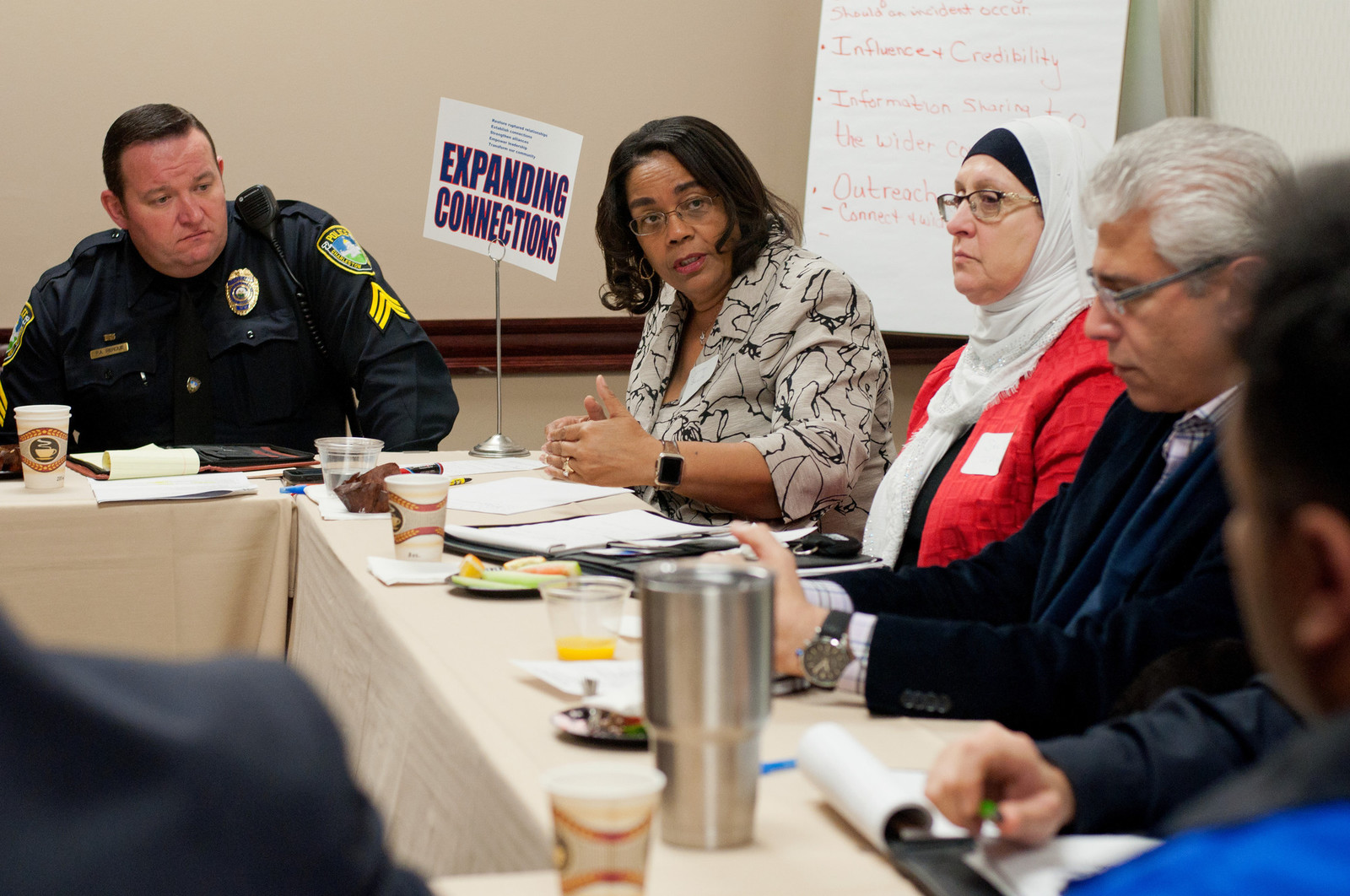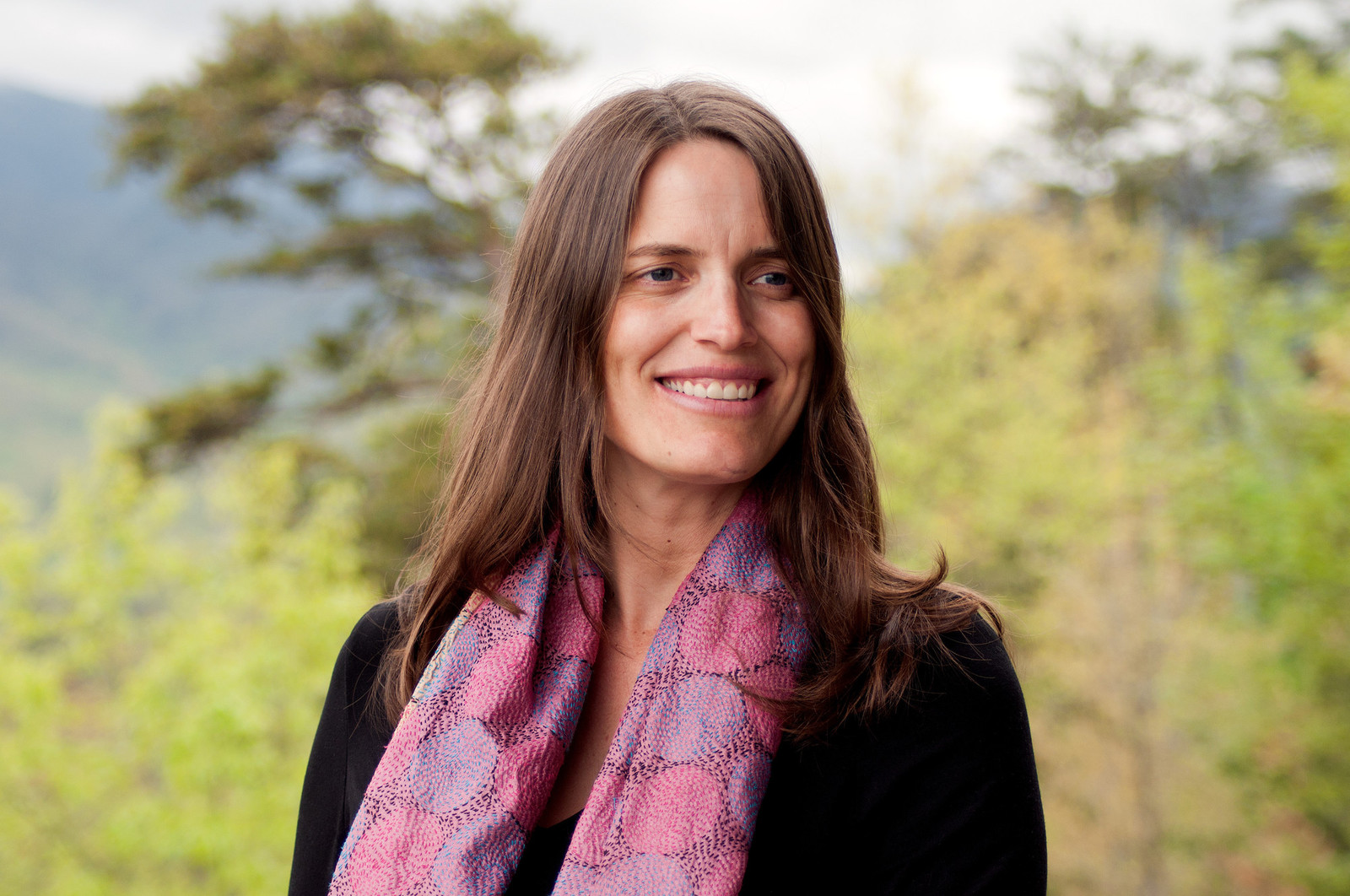
Charleston police meeting regularly with local clergy and community leaders, building relationships and addressing tensions between residents and police. Bryan Vana / AFSC
Editor's note: This blog post was originally published on Oct. 12, 2016 and updated on March 17, 2017.
Charleston, West Virginia made headlines last year when local police and community groups announced plans to improve race relations. Here’s a look at how this remarkable agreement came together and what it means for other cities grappling with racism and police violence.
Our first meeting with Charleston Police Chief Brent Webster in October 2015 was slightly tense—for obvious reasons. We were sitting around a table to discuss the glaring racial disparities in arrests by the Charleston Police Department.
According to the department’s own data, in our small city of just over 50,000 people, the arrest rate for Black people was more than double that of whites.
At the table with the police chief: A team of student and faith leaders, representatives from community organizations—including AFSC, ACLU, NAACP-Charleston, and Black Ministerial Alliance—and staff from the county public defender’s office.
Before delving into the problem at hand, each of us shared why we thought it was critical to address racism in our society. We wanted to emphasize that this meeting wasn’t about singling out the Charleston Police Department as a racist institution, but rather about taking steps to confront the broader problem of systemic racism in our city and across the nation.
Takeiya Smith, AFSC’s racial justice intern at the time, described how she had been pulled over and unduly questioned by police on several occasions, for no apparent reason other than being Black.
Pastor Matthew Watts, a community leader on Charleston’s West Side, recounted the time he was handing keys to his son on the sidewalk of his own neighborhood when he was challenged by a police officer, who suspected drugs.
I talked about how—unlike others at the table—I don’t worry that one day my four-year-old daughter, who is white, might not walk away, unharmed, from an interaction with police.
Tensions rose when police tried to explain disparities in the number of arrests with the number of 911 calls coming from the West Side of Charleston, a predominantly Black neighborhood. But to their credit, community members didn’t let this tension shut down negotiations. Instead, we all agreed that it would be helpful to have more police data on arrests so we could better analyze the issue.

Responding to community concerns
Our 2015 meeting with Chief Webster grew out of a Call to Action for Racial Equality (CARE) community event organized by AFSC and partners the previous year. More than 150 people had gathered to discuss racial issues facing our city, identifying community-police relations as a pressing concern.
The meeting was also the beginning of a yearlong collaboration. The CARE coalition, which now includes leaders from the police department, met monthly to develop concrete initiatives to improve race relations in our city, and in the fall of 2016, Chief Webster held a press conference with coalition members to announce the eightpoint plan of action we developed together.
The plan includes:
- De-escalation training: All Charleston officers completed de-escalation training last year, and five have become certified de-escalation trainers through the nationally accredited Racial Intelligence Training & Engagement curriculum.
- Publishing monthly arrest statistics: Data includes race, age, gender, and cause of arrest, educating officers and community members about crime trends and possible causes of racial disparities.
- Body cameras: Officers began wearing body cameras and implementing national best practices to ensure the devices protect both officers and community members.
- Youth advisory council: A new council of at least 10 young people—ages 18 to 25, across race and religious differences—are now planning events where youth and police can interact and will make recommendations for continuing to improve relations between youth and officers.
- Anti-racism trainings: All officers from the police chief to new recruits have completed—or will undergo—a series of daylong trainings facilitated by AFSC and other organizations.
- Roll-call presentations by community members: New opportunities have been created for officers and community leaders to hear from one another.
- Community Service Awards: Community leaders will work with police officers to create community policing standards—and then recognize all officers meeting those standards annually.
- Collaborating on advocacy issues: Police and community leaders are working together to advocate for state policy changes to reduce recidivism and help people returning home from prison.
This plan of action is significant, outlining concrete steps that the Charleston Police Department has begun to implement.
What’s more, the collaborative process through which we reached this agreement has already helped deepen the relationship between police and the community.
That’s important for three reasons:
- We’re better equipped to deal collectively with violent or deadly incidents if they happen.
- We have an understanding of our mutual self-interest in addressing racism—as well as mass incarceration—not only in policing but also in other parts of the criminal justice system, and are ready to tackle policy solutions together.
- We’re better poised to take on new opportunities or struggles as they arise, with open lines of communication and mutual trust.
Since the press conference last fall, the response from across the country has been overwhelming. The Charleston Police Department has received calls from around the state and across the country praising the department’s efforts, including from other police departments and government officials who want to replicate this effort.
Here in Charleston, the response from community members has been one of cautious optimism. People understand that certainly there are no quick, easy solutions to systemic racism in our society, and that we still have a lot of work to do, but this is a step in the right direction.
West Virginia hasn’t historically been on the forefront in addressing racial and economic inequality, but I’m proud to say that for once, we might be leading the pack.

Resource: How can my community work to address racism in policing?
What we learned in Charleston that could inform your community’s efforts:
- Build a broad coalition of people and organizations. Our coalition includes faith leaders, young people negatively affected by experiences with police, advocacy and social service organizations, and the public defender’s office.
- Focus on a specific problem and solutions to address it. We focused on racial disparities in arrest rates, rather than every issue related to racism in policing. Having a clear focus made it more manageable for us to research the problem, propose solutions, and develop a final plan of action.
- Be open and honest in all communications. Before our first meeting with police leadership, our coalition shared our concerns, proposals, and supporting materials through emails with Chief Webster and Corporal Errol Randle. We didn’t want anyone to feel blindsided by concerns or information presented.
- Be prepared for whatever defensiveness may arise. Help people feel safe and heard. In meeting with police, we make sure not to single out the department or certain officers. Instead, we talk about how we all operate under this system of institutional racism and share personal stories about how we’re affected, so we can find common cause. You’re not going to get anywhere if people feel like they’re being attacked or shut down.
- Understand resistance from community members. People often asked us, “Why bother?” Many have had negative interactions with police, or have family members who have, and have a deep mistrust of police. Some feel that they are forsaking their community if they support our coalition’s efforts. I’m hopeful that the initiatives we’re working on—such as the youth council, which encourages dialogue between young people and police—will help to chip away at some of that.
